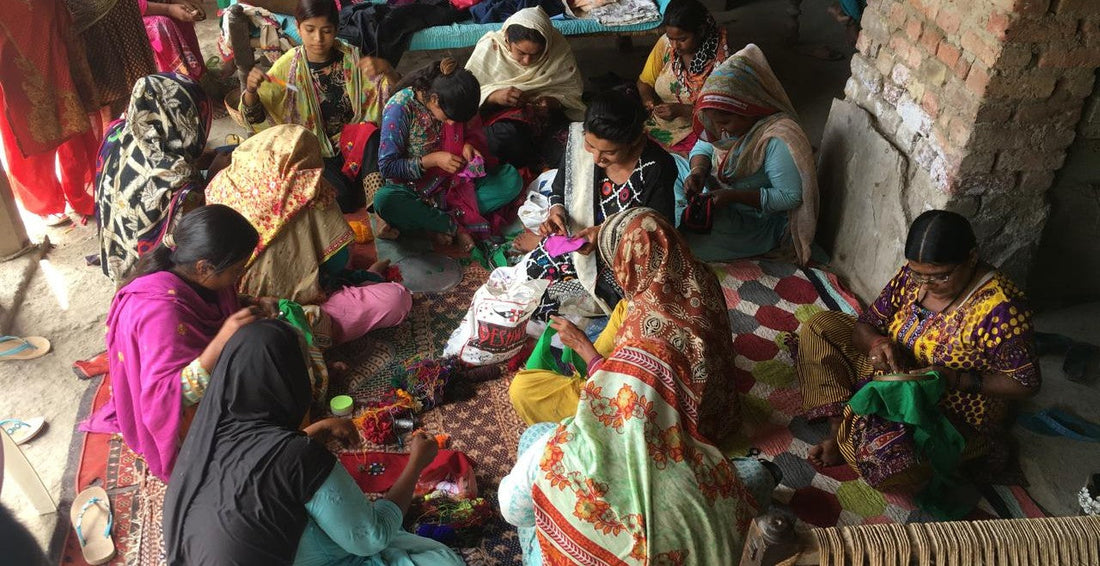
The Craft Revival in Pakistan: Stitching Together Heritage, Hope & Empowerment
Across Pakistan’s deserts, mountains, and river plains, women’s hands continue to shape the story of our culture — one stitch, weave, and motif at a time. From Sindh’s vivid rilli quilts to the intricate embroidery of Balochistan and the delicate basketry of South Punjab, craft has long been the language of women’s creativity and resilience.
But in the modern rush of fast fashion and mass production, much of this artistry was at risk of fading away. That’s where Pakistan’s craft revival movement comes in — a powerful return to heritage, sustainability, and human connection.
What is Craft Revival?
Craft revival is the effort to preserve, modernize, and reintroduce traditional crafts into today’s markets while protecting the dignity and livelihoods of the artisans behind them. It’s not nostalgia — it’s innovation rooted in heritage.
This movement brings together designers, social entrepreneurs, and artisan collectives to reimagine heritage techniques in ways that appeal to contemporary buyers — creating products that are both culturally authentic and globally relevant.
Why Craft Revival Matters — Socially, Culturally & Economically
1. Empowering Women, Strengthening Communities
In rural Pakistan, thousands of women work from home — balancing domestic life with their artistry. Craft revival gives them income, confidence, and purpose.
• It allows women to earn without leaving their homes, respecting cultural norms.
• It creates pathways for financial independence, education, and decision-making power.
• Each piece sold translates directly into sustainable livelihoods for rural families.
2. Preserving Cultural Identity
Craft revival isn’t just about fabric — it’s about memory. Every motif and pattern tells a story: a region, a tribe, a celebration. Reviving these crafts safeguards our intangible cultural heritage, ensuring that younger generations continue to learn and take pride in them.
3. Building an Ethical, Sustainable Economy
Pakistan’s handmade sector is a sleeping giant in the sustainable economy. As global consumers turn toward slow fashion, handmade craft provides a zero-waste, eco-friendly alternative that reduces industrial pollution and champions mindful production.
• Handmade goods use local, natural materials.
• Production is small-scale and waste-conscious.
• Each sale circulates money within rural communities rather than global supply chains.
Love Handmade: A Living Example of Craft Revival
At Love Handmade, craft revival isn’t just a concept — it’s a daily practice. The brand partners directly with rural women artisans across Sindh and Punjab, reviving indigenous techniques that had nearly disappeared.
Here’s how Love Handmade brings craft revival to life:
• Reviving Heritage Techniques: Traditional rilli quilting, ajrak block-printing, pit-loom weaving, and date-leaf basketry are reimagined into wearable, functional art — from reversible jackets to home textiles.
• Empowering Artisans: Each artisan works from her home, receiving fair wages and flexible schedules that respect her family responsibilities.
• Sustainable by Design: Using natural fabrics, local dyes, and low-waste methods, every piece is slow-made and eco-conscious.
• Blending Tradition with Modern Aesthetics: Love Handmade’s design studio works collaboratively with artisans to adapt traditional motifs into modern silhouettes that appeal to global audiences.
• Storytelling & Visibility: Each collection highlights the people behind the craft — their names, their stories, their dreams — connecting urban consumers to rural creators.
Through this work, Love Handmade has helped artisans earn consistent income, revive dying crafts, and preserve Pakistan’s design heritage — proving that tradition and innovation can thrive together.
The Bigger Picture: Why It Matters for Pakistan’s Future
Craft revival isn’t just an artistic endeavor; it’s a movement of economic inclusion, cultural pride, and sustainable growth.
• It turns rural craftsmanship into a viable part of Pakistan’s creative economy.
• It empowers women to become entrepreneurs of their own heritage.
• It connects Pakistan’s villages with the world — through beauty, skill, and meaning.
As the global market increasingly values handmade, ethical, and traceable products, Pakistan’s artisans stand at the forefront of this new era. Brands like Love Handmade are proving that reviving crafts isn’t just good for culture — it’s good for business, communities, and the planet.
Craft revival is not about going back — it’s about moving forward, together.
Through every stitch, Pakistan’s women are not only preserving the past — they’re shaping a more equitable, creative, and sustainable future.
